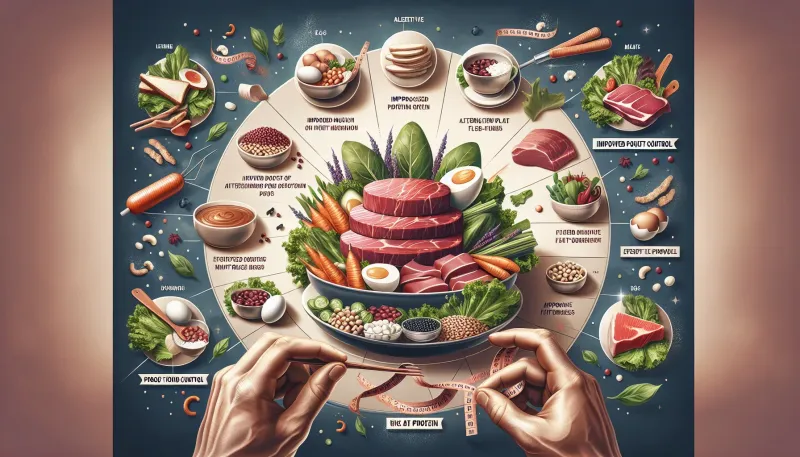Effective High-Protein Diet for Weight Management: Tips & Benefits

Learn the secrets of an effective high-protein diet for weight management. Discover tips, benefits, and how it can help you achieve your weight goals.
Weight management can be a challenging endeavor, but an effective high-protein diet can play a crucial role in achieving and maintaining your desired weight. This article will delve into the benefits of a high-protein diet for weight management, offer practical tips, and highlight how this nutritional approach can help you reach your health goals.
Understanding the High-Protein Diet
A high-protein diet emphasizes the consumption of protein-rich foods while moderating carbohydrates and fats. This diet is designed to increase satiety, promote muscle retention, and support overall metabolic health.
What Constitutes a High-Protein Diet?
A high-protein diet typically involves getting 25-30% of your daily calorie intake from protein. This translates to consuming lean meats, fish, dairy products, legumes, nuts, and seeds.
Examples of high-protein foods include:
- Lean meats like chicken breast, turkey, and lean beef
- Fish such as salmon, tuna, and tilapia
- Dairy products such as Greek yogurt, cottage cheese, and milk
- Legumes like lentils, beans, and chickpeas
- Nuts and seeds like almonds, chia seeds, and pumpkin seeds
The Benefits of a High-Protein Diet for Weight Management
Incorporating a high-protein diet into your routine offers several advantages, especially when it comes to weight management. Below, we explore the key benefits:
1. Enhanced Satiety and Reduced Hunger
Protein is known to be more satiating than carbohydrates or fats. Consuming protein-rich foods can significantly reduce hunger levels, helping you feel full for longer periods. This can lead to a reduction in overall calorie intake, which is crucial for weight loss and maintenance.
2. Muscle Preservation and Fat Loss
While on a calorie deficit, there is a risk of losing muscle mass along with fat. Protein aids in preserving lean muscle mass, ensuring that the weight you lose primarily comes from fat stores. This is particularly important for maintaining a healthy metabolic rate.
3. Improved Metabolism
Protein has a higher thermic effect of food (TEF) compared to carbohydrates and fats. This means that the body uses more energy (calories) to digest, absorb, and process protein. This boost in metabolic rate can help with weight management efforts.
4. Enhanced Body Composition
A high-protein diet can contribute to better body composition by reducing fat mass and increasing or preserving muscle mass. This not only improves physical appearance but also supports overall health and functional strength.
5. Blood Sugar Regulation
Protein consumption can help stabilize blood sugar levels by slowing down the absorption of sugar into the bloodstream. This can prevent insulin spikes and crashes, making it easier to avoid cravings and manage weight.
Practical Tips for Implementing a High-Protein Diet
Transitioning to a high-protein diet can be straightforward with the right strategies. Here are some practical tips to help you successfully incorporate more protein into your meals:
1. Plan Your Meals
Meal planning ensures that you consistently include high-protein foods in your diet. Design your meals around protein sources, and complement them with vegetables, healthy fats, and whole grains.
2. Protein-Rich Snacks
Keep high-protein snacks like nuts, seeds, yogurt, and protein bars on hand. These can help curb hunger between meals and keep your protein intake consistent throughout the day.
3. Vary Your Protein Sources
Incorporate a variety of protein sources to ensure that you get a broad spectrum of nutrients. Experiment with different types of meat, fish, legumes, and plant-based proteins.
4. Monitor Portion Sizes
While protein is essential, it's crucial to keep portion sizes in check to avoid overconsumption of calories. Balance your plate with vegetables and whole grains to create a nutrient-dense meal.
5. Stay Hydrated
Protein metabolism can increase water needs. Ensure you stay hydrated by drinking plenty of water throughout the day. This also aids in digestion and overall health.
Real-Life Success Stories
Many individuals have found success in managing their weight with a high-protein diet. Take, for example, Sarah, who lost 30 pounds over six months by focusing on protein-rich foods and incorporating regular exercise. She not only saw a reduction in weight but also noticed improved energy levels and overall well-being.
John, another success story, combined a high-protein diet with strength training. He experienced significant muscle growth, reduced body fat, and enhanced physical performance.
Conclusion
A high-protein diet for weight management offers numerous benefits, including enhanced satiety, muscle preservation, improved metabolism, and better body composition. By planning your meals, incorporating a variety of protein sources, and staying mindful of portion sizes, you can harness the power of protein to achieve your weight management goals.
Remember, individual results may vary, and it's essential to consult with a healthcare provider or nutritionist before making significant changes to your diet. With the right approach and commitment, a high-protein diet can be a powerful tool in your weight management journey.



























